Can Arnica Oil Help Promote Hair Growth?
Learn everything about the myriad benefits this herb offers and what it can do for your hair.
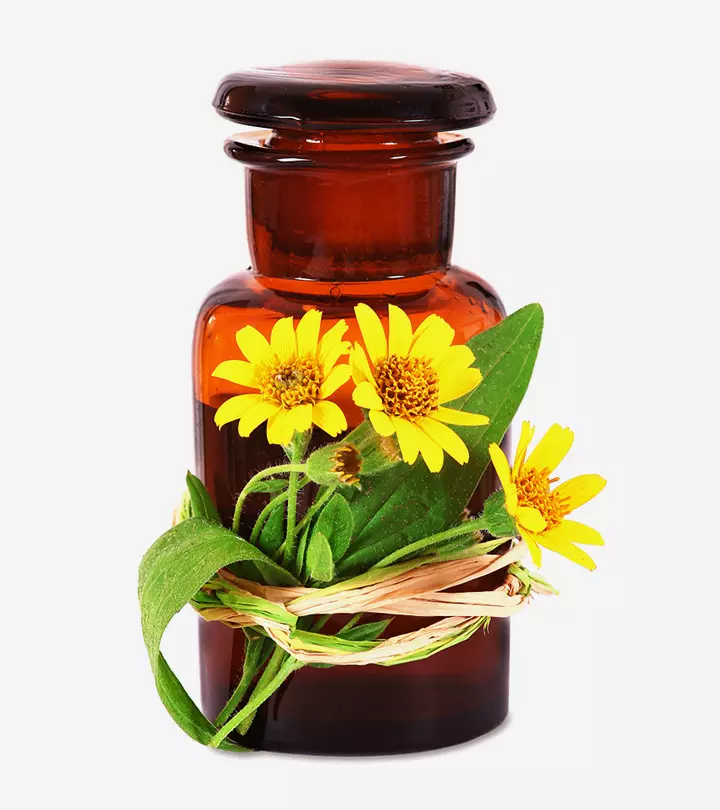
Image: ShutterStock
Have you ever used arnica oil for hair? It has become extremely popular for the multiple benefits it offers. The oil is claimed to clear debris and dead cells from the scalp and promote hair health. To some extent, it may also strengthen hair follicles. If used correctly, arnica oil can efficiently treat a few scalp and hair conditions. Read on to know more about the array of benefits arnica oil offers and how you can incorporate this oil into your hair care regimen.
 Trivia
Trivia Know Your Ingredient: Arnica Oil
Know Your Ingredient: Arnica OilWhat Is It?
An oil extract produced from the Arnica Montana Flower.
What Are Its Benefits?
It has anti-inflammatory and antimicrobial properties and can unplug hair follicles, treat dandruff and split ends, and boost hair health.
Who Can Use It?
It can be used by anyone in moderation.
How Often?
It can be used 3-4 times a week in small quantities.
Caution
Some individuals might be allergic or sensitive to it. Also, excess use can result in nausea, irritation, vomiting, rashes, diarrhea, shortness of breath, a rapid heartbeat, and high blood pressure.
In This Article
What Is Arnica Oil?
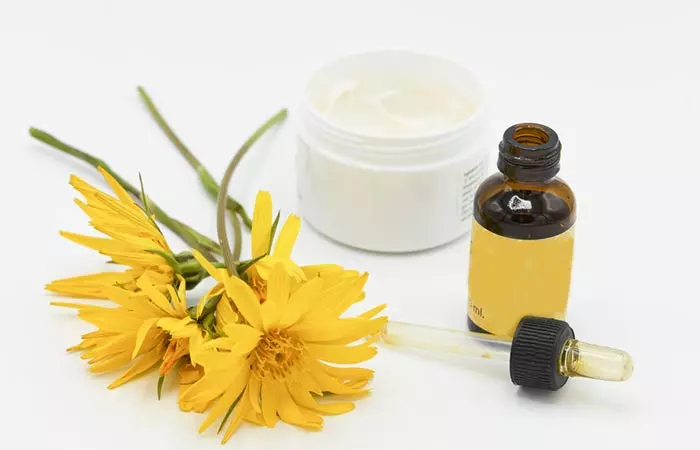
Arnica montana, also known as the mountain daisy, is a yellow-orange perennial flowering herb grown in the cold and rocky regions of Eastern Europe and Siberia. Pure arnica oil is renowned for its hair benefits. The distilled extract of arnica, when diluted, is believed to treat various scalp and hair issues. Let us study the various benefits of arnica oil for hair in detail below.
Key Takeaways
- From split ends to scalp and root issues, arnica oil can be a one-stop solution for all hair problems.
- It keeps the scalp clean by removing bacteria, absorbing excess oil, and stimulating hair follicles.
- You can mix it with shampoos, conditioners, or oils like almond or coconut oil.
Benefits Of Arnica Oil For Hair
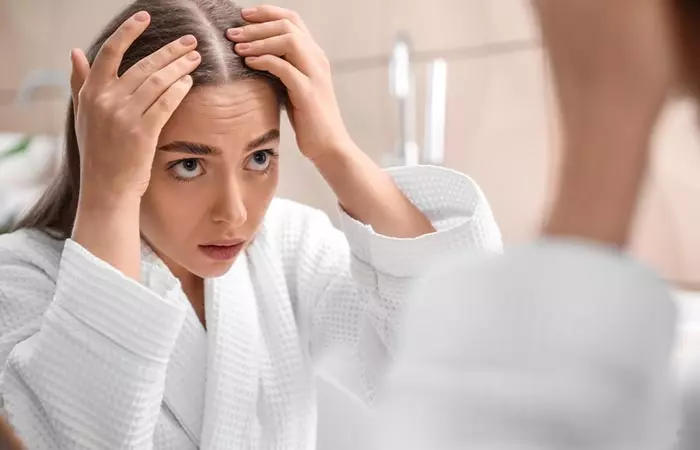
1. May Boost Scalp Health
Arnica oil is known to have amazing antibacterial and anti-inflammatory properties
(1). It also may help mitigate pain caused by inflammation. It keeps the scalp free from dirt, sebum, debris, and excess oil. Arnica oil also clears away bacteria and built-up oils.
2. May Help Treat Hair Loss
Topical application of arnica oil may stimulate hair follicles and strengthen hair roots.
Anecdotal evidence suggests that it also may strengthen the hair strands and aid in hair loss prevention. It may enhance hair elasticity. Arnica oil, in a highly concentrated form, is thought to treat alopecia efficiently. However, more research is warranted in this regard.
3. May Improve Hair Shine
Arnica oil provides scalp and hair nourishment. Anecdotal evidence suggests that it can improve hair shine and also make your hair softer and smoother.
4. May Help Treat Dandruff
Research is limited in this regard. Arnica oil may help treat seborrheic dermatitis or dandruff caused by fungal infections, dry skin, and scalp irritation. Some anecdotal evidence also suggests that the oil may improve scalp texture and relieve itching and inflammation.
5. May Treat Split Ends
You can strengthen your hair strands by coating them with arnica oil. The oil’s healthy proteins may eliminate split ends. Massage your scalp with the oil regularly to combat splits.
6. May Prevent Premature Hair Graying
While some claim that regularly applying this herbal oil could prevent premature hair graying, more research is warranted in this regard.
 Trivia
TriviaMost of the benefits of arnica oil are yet to be validated by the scientific community. However, using the oil regularly appears to be generally beneficial. In the following section, we have listed how you can use the oil to explore the potential arnica benefits.
How To Use Arnica Oil
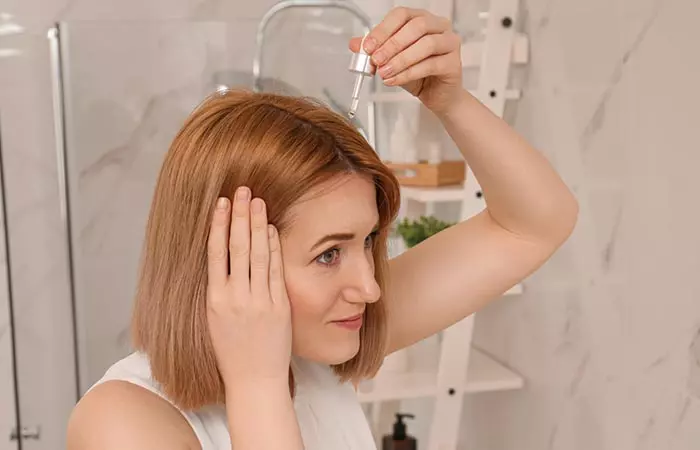
Arnica oil can be applied topically as a treatment for hair and scalp conditions. You can mix it with your hair conditioners, shampoos, and leave-in hair treatments.
Here is a step-by-step guide to applying arnica oil:
- Take the required quantity of oil into a bowl. Add some almond or coconut oil to it. The quantity will depend on your hair length.
- Apply the oil mixture to your scalp evenly and massage. Move your fingertips in slow, circular motions for 15 minutes.
- Apply the oil in the evening or leave it on overnight for best results. Wash your hair with lukewarm or plain water the next morning.
- Follow this procedure 3 to 4 times a week for two months.
You can also mix arnica oil with other natural ingredients like cinchona, rosemary, shea butter, sandalwood oil, grapeseed oil, sage, coconut oil, cantharis, and calendula to create effective natural remedies for your scalp and hair.
While arnica oil is safe for many people, you may experience a few side effects. We explore the same in the next section.
Side Effects Of Arnica Oil For Hair

- You may experience allergic reactions like headaches, runny nose, inflamed sinuses, itching, hives, or difficulty in breathing. More research is needed in this regard.
- People with ragweed allergy must avoid using arnica oil.
- You must never ingest arnica oil as it supposedly is toxic (1). Anecdotal evidence suggests that it may elevate blood pressure levels and increase one’s heart rate. Pregnant and breastfeeding women must definitely not ingest the oil.
Where To Buy Arnica Oil

You can purchase arnica oil in beauty supply stores, health food stores, and grocery stores. You may also procure it online.
You can also try making arnica oil. Jay Jay Jeffery, a blogger, shares how she makes arnica oil balm in a tiny VW van. She shares the journey of collecting, harvesting, and infusing the Arnica flowers into coconut oil. She writes, “ Dry flowers for a few hours to wilt. Cover flowers in a jar with oil. Leave in the hot sun for a few days until flowers lose their vibrancy. Press out flowers from oil. Label oil in jar and compost flower heads.(i).”
Be informed that the benefits of arnica oil for hair have not been approved by the FDA. Hence, the results from its application may vary from person to person.
Infographic: 5 Reasons For Using Arnica Oil For Your Hair
Arnica oil is rich in essential nutrients, which may help cleanse your scalp, promote hair growth, and improve your overall hair health. If you still don’t believe us, you can check out this infographic to know more about its benefits before adding it to your hair care routine.
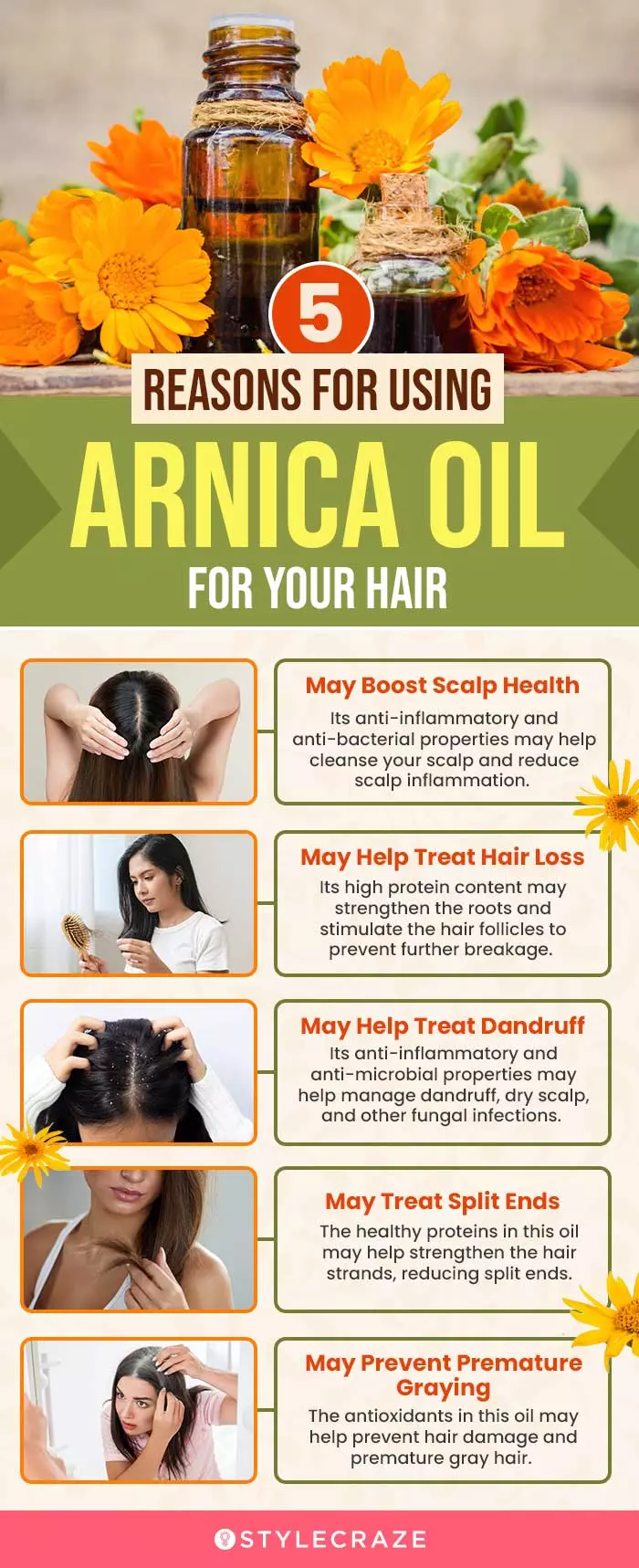
Illustration: StyleCraze Design Team
Many people vouch for the benefits of using arnica oil for hair growth. It is packed with beneficial bioactive compounds, vitamins, and minerals that support your hair health. Arnica oil helps address many scalp and hair issues. Incorporating it into your hair care routine could enhance overall hair health and offer solutions for common concerns, such as premature graying of hair, and fighting dandruff. While more research is needed to fully understand its benefits, anecdotal evidence suggests that you can use it safely in moderate amounts. If you experience any adverse effects, limit its use and seek medical advice.
Frequently Asked Questions
Is arnica oil good for gray hair?
Arnica oil may reduce premature graying. However, it cannot reverse gray hair caused by aging.
What does arnica oil smell like?
Arnica oil has a pine-like scent.
How often should you apply arnica oil?
This depends on the hair issue you are trying to resolve. If you have normal hair, you can apply arnica oil once or twice a week.
Do I have to dilute arnica oil?
Yes, you need to dilute arnica oil before applying it to your skin or hair. Dilute it with a carrier oil like coconut, olive, or jojoba oil.
Is arnica oil safe for all hair types?
Arnica oil is generally considered safe for all hair types. It exhibits anti-inflammatory and antibacterial properties that help reduce scalp inflammation and act against several scalp infections (1). However, people with ragweed allergy should avoid this oil.
Is arnica oil safe to use on colored or chemically treated hair?
Yes. It is safe to use arnica oil on colored and chemically treated hair. However, make sure to dilute it with any carrier oil to avoid irritation.
Are there any known interactions between arnica oil and other hair care products?
Much anecdotal evidence suggests that arnica oil is safe to use with other hair care products. However, there is limited data available in this regard.
Is arnica oil suitable for those with sensitive scalps?
Arnica oil may cause irritation in some people with sensitive scalps due to its high concentration of active components. Hence, it is recommended to do a patch test before using it to avoid its negative reactions.
Illustration: Arnica Oil For Hair – Benefits And How To Use For Hair Growth
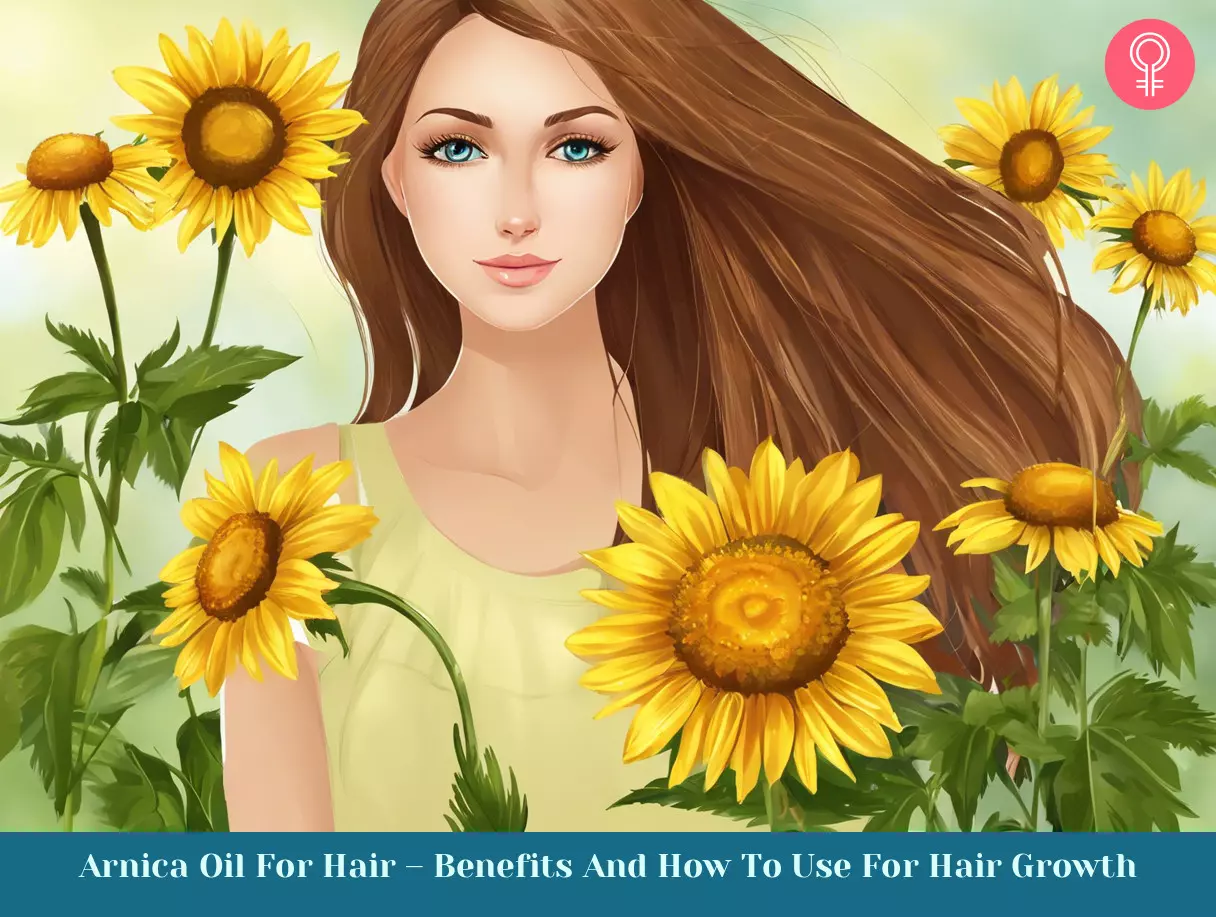
Image: Stable Diffusion/StyleCraze Design Team
Discover the art of creating infused arnica oil with a touch of lavender. Set out on an aromatic journey with this step-by-step instructional video that will help you craft your very own arnica-infused oil. Watch it now!
Personal Experience: Source
StyleCraze's articles are interwoven with authentic personal narratives that provide depth and resonance to our content. Below are the sources of the personal accounts referenced in this article.
i. Midnight Sun Arnica Oilhttps://medium.com/@jayjayjeffery/midnight-sun-arnica-oil-b4cfb316350f
References
Articles on StyleCraze are backed by verified information from peer-reviewed and academic research papers, reputed organizations, research institutions, and medical associations to ensure accuracy and relevance. Read our editorial policy to learn more.
- In vitro antimicrobial activity of propolis and Arnica montana against oral pathogens
https://pubmed.ncbi.nlm.nih.gov/10716618/
Read full bio of Dr. Sreekar Harinatha
Read full bio of Arshiya Syeda
Read full bio of Ramona Sinha
Read full bio of Medha Deb






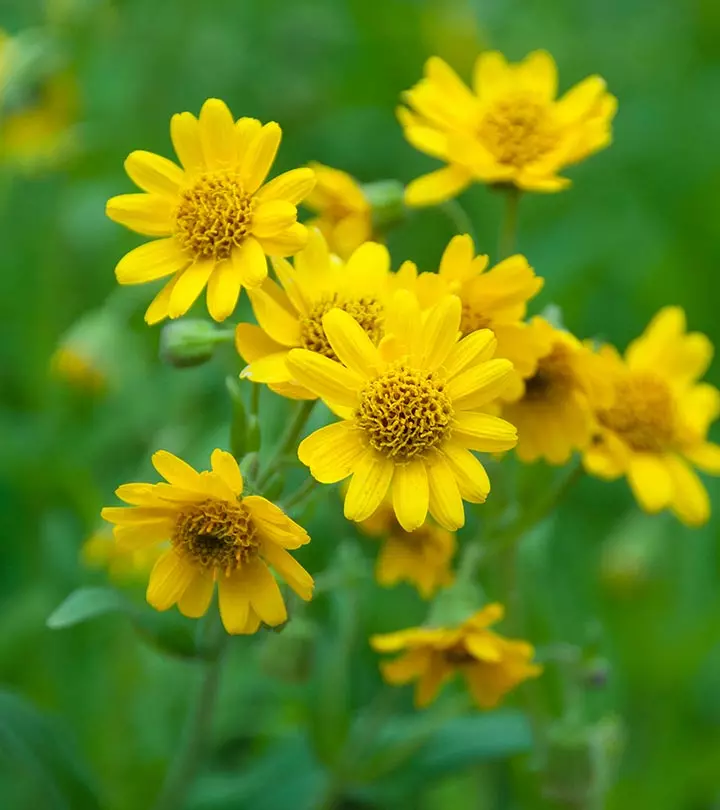
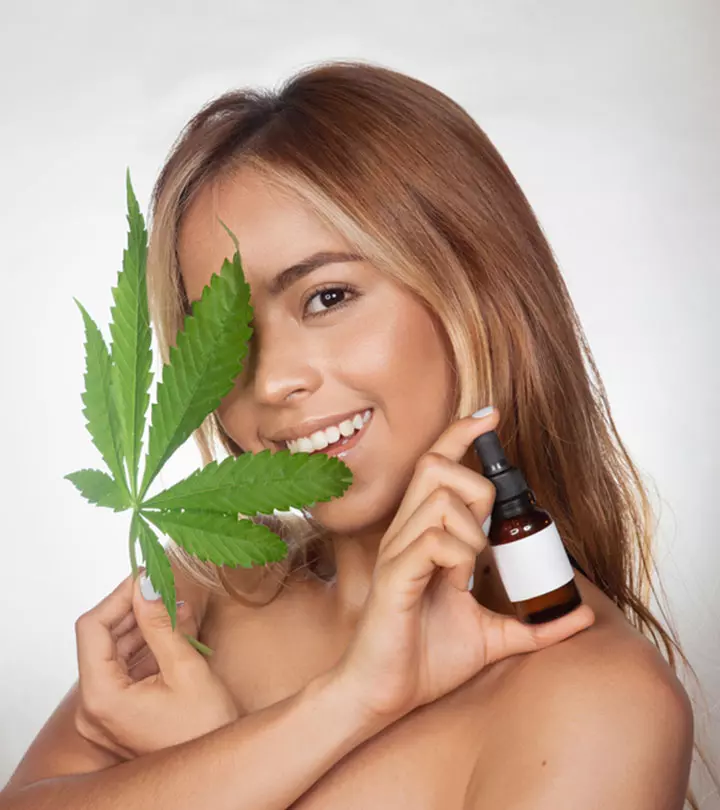


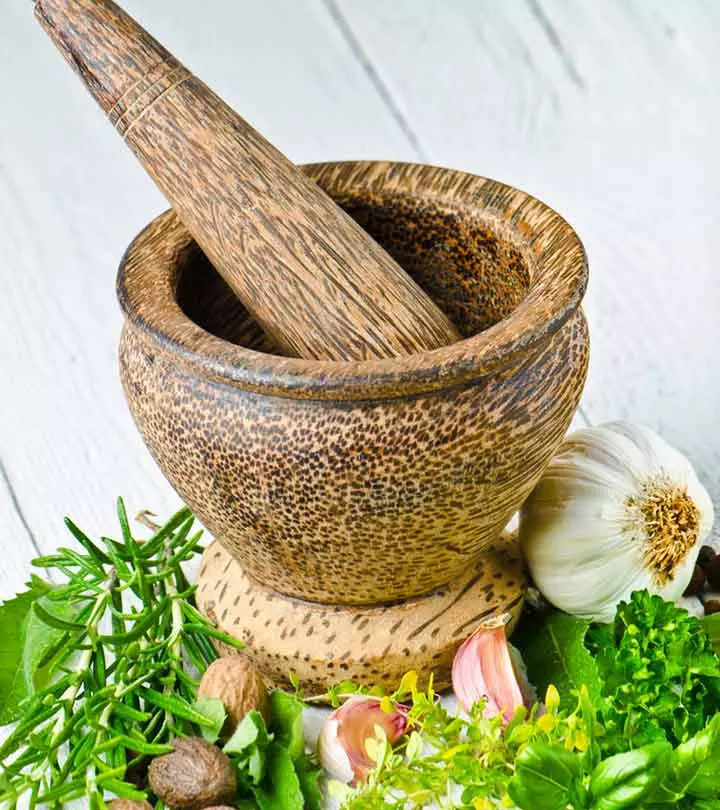
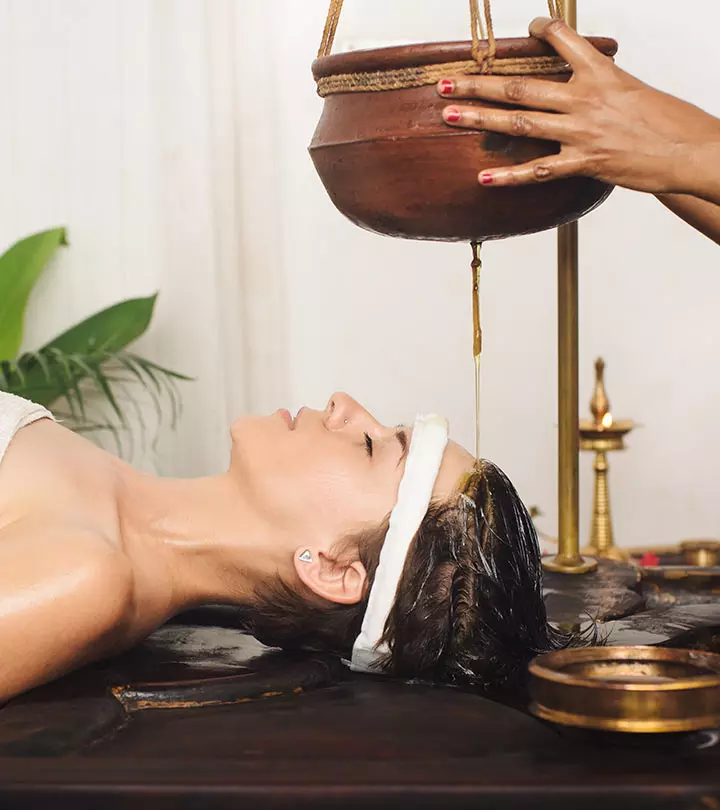
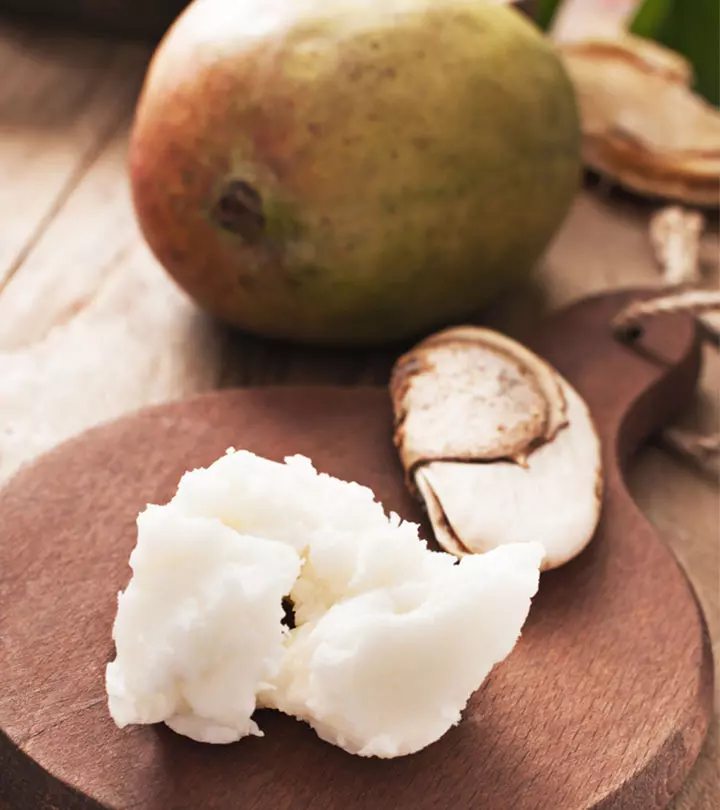
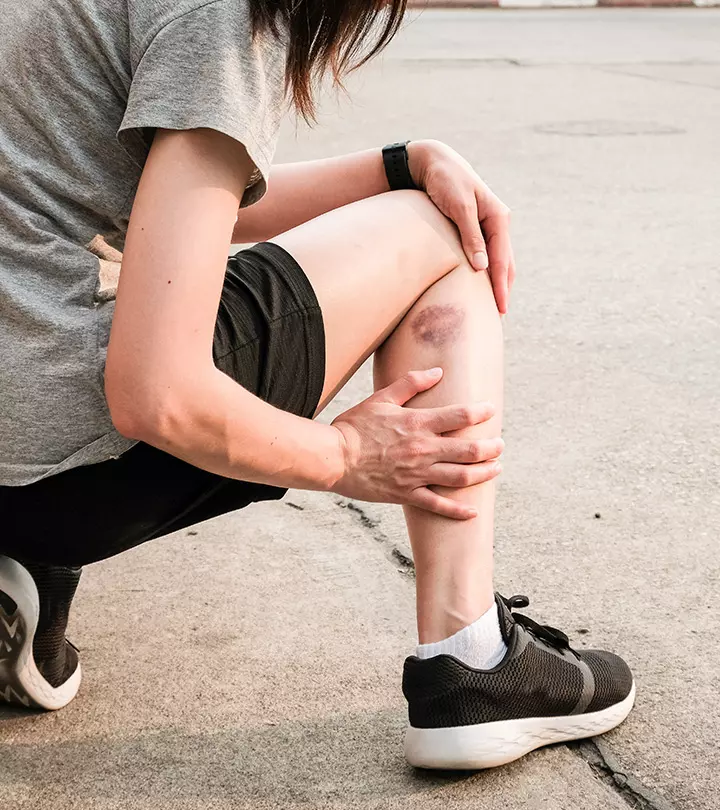


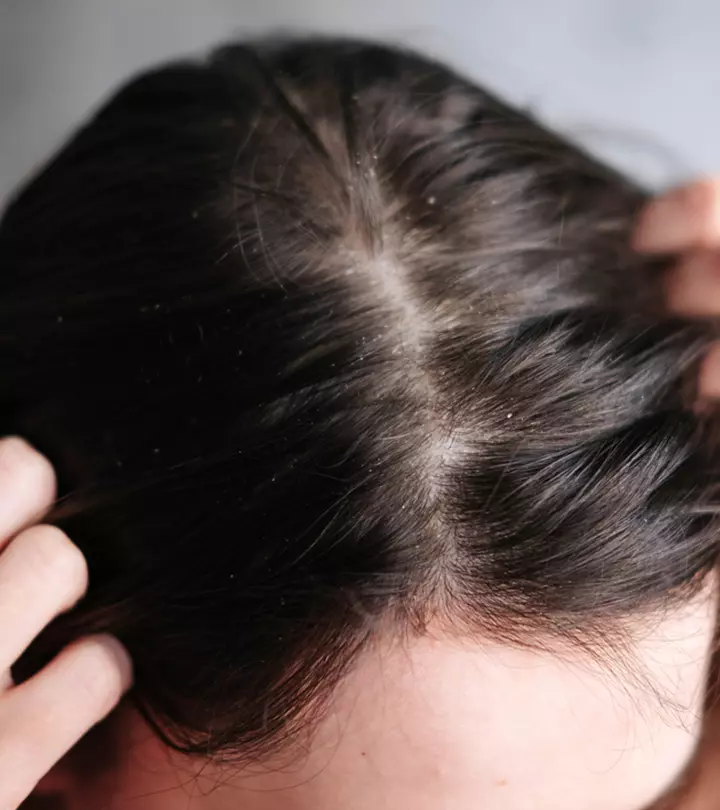

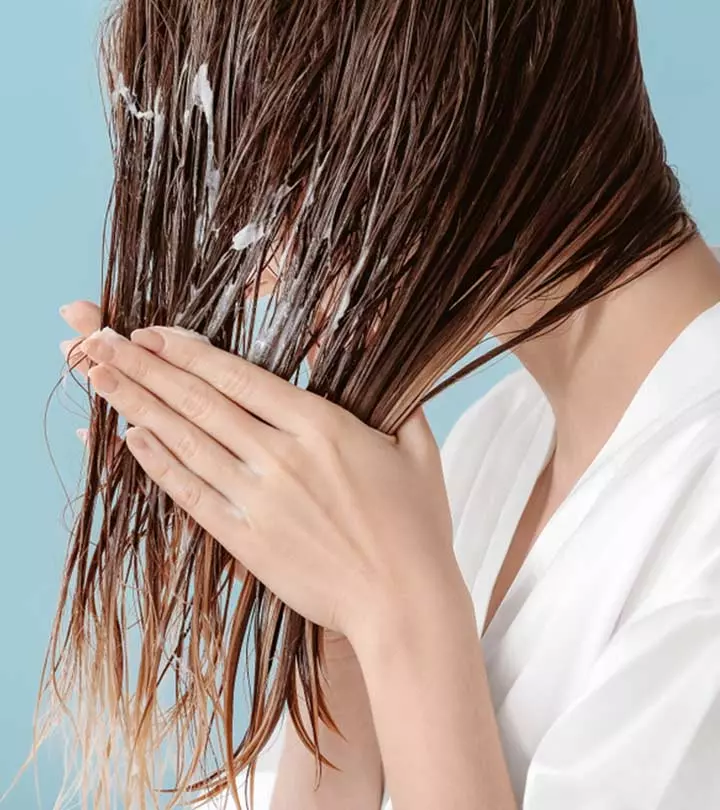
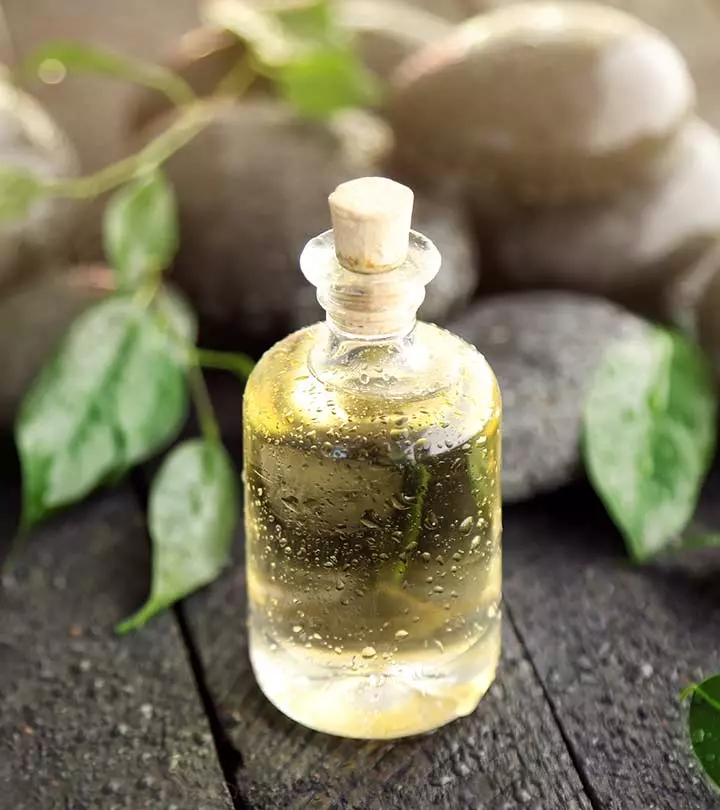

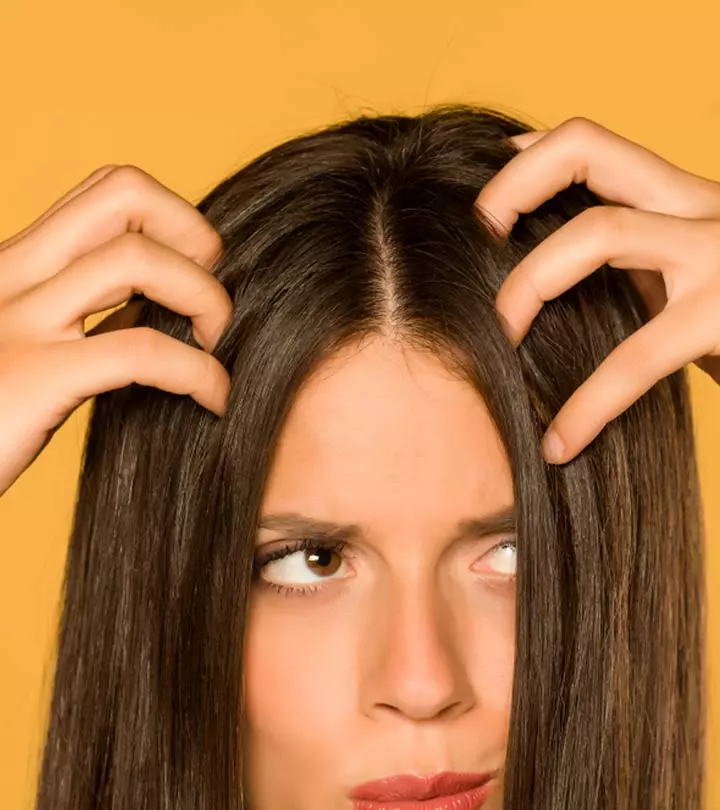
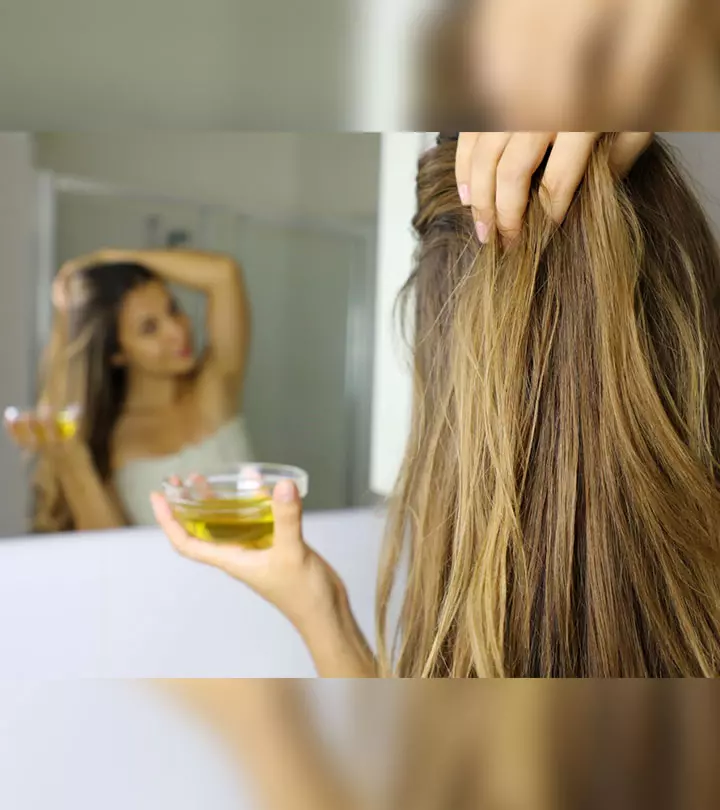
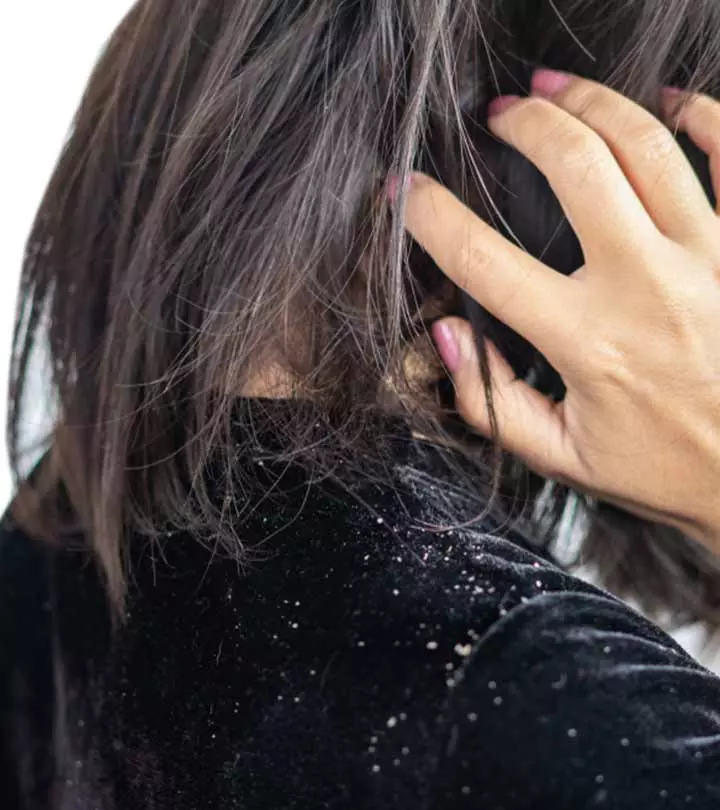
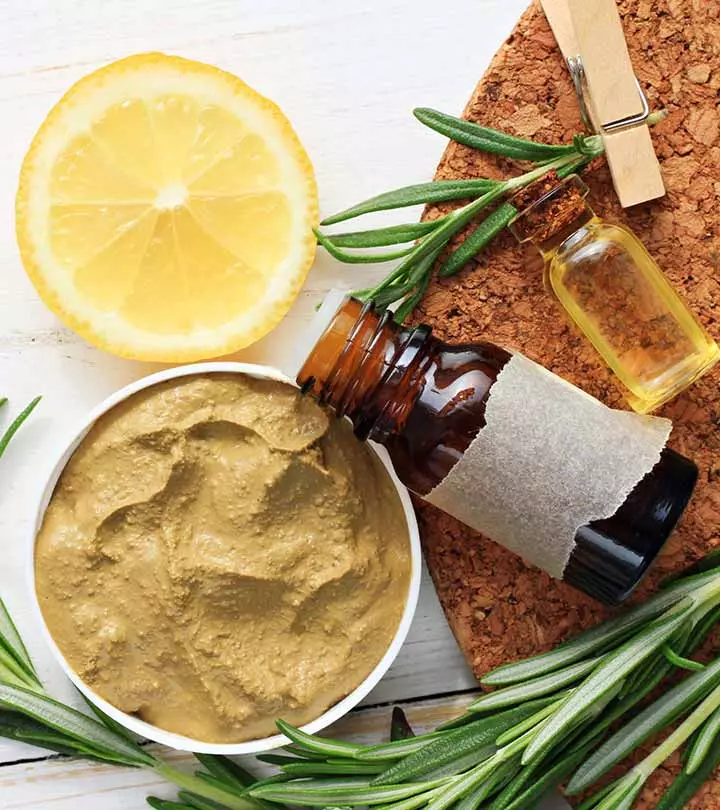
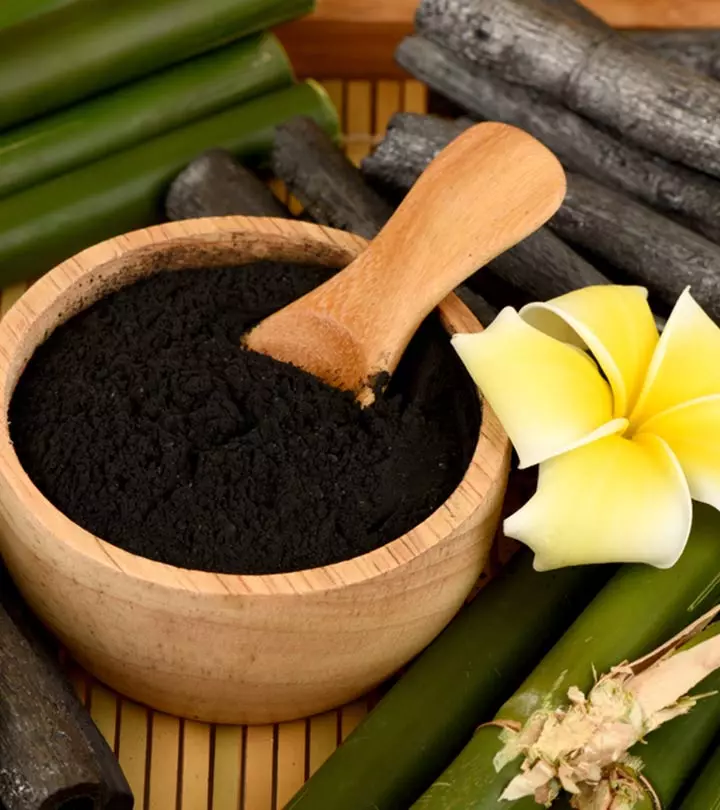
Community Experiences
Join the conversation and become a part of our empowering community! Share your stories, experiences, and insights to connect with other beauty, lifestyle, and health enthusiasts.